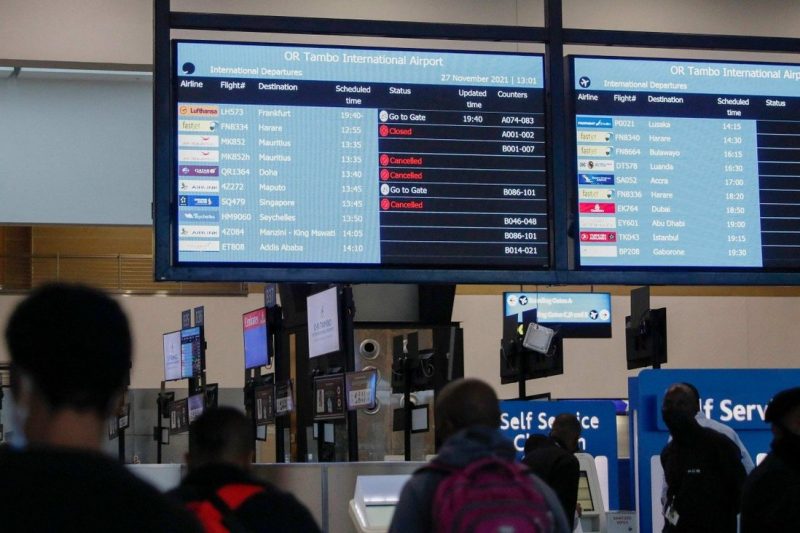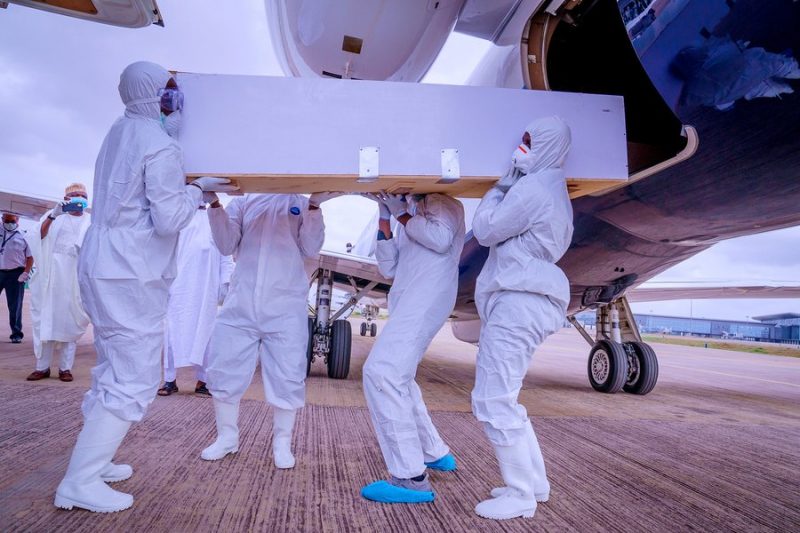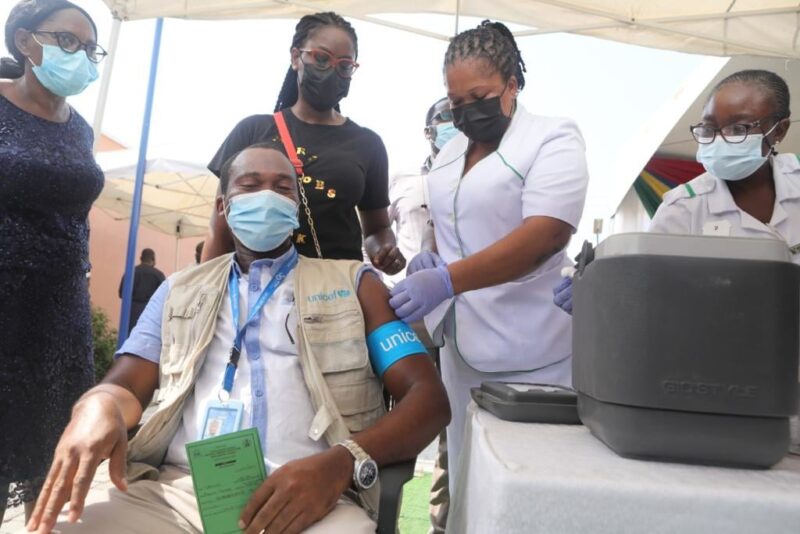COVID-19
No case of Omicron COVID variant in Nigeria – NCDC

- Variant detected in more countries
The Nigeria Centre for Disease Control (NCDC) has said no case of the Omicron COVID-19 variant has been detected in Nigeria.
The new variant said to be more deadly that the Delta variant has reportedly been detected in more countries after news broke out that the UK recorded the first case last week.
In a statement on Sunday, the NCDC Director-General, Ifedayo Adetifa, said the Federal Ministry of Health (FMOH) and the NCDC were aware of reports of a new COVID-19 variant and monitoring emerging evidence on this new variant and its implication, to inform Nigeria’s response to the COVID-19 pandemic.
“While this variant has so far not been detected in Nigeria, a number of cases have now been reported in the UK, Israel, Botswana, Hong-Kong, Germany, Belgium, Italy and counting. However, no deaths have been attributed to this new variant yet,“ the statement reads.
“Given the high number of mutations present in the Omicron variant and the exponential rise in COVID-19 cases observed in South Africa, this virus is considered highly transmissible and may also present an increased risk of reinfection compared to other VOCs.”
He, however, said the fears about the variant’s ability to evade protective immune responses and/or its being vaccine resistant are only theoretical so far.
“This virus can still be detected with existing Polymerase Chain Reaction (PCR) tests. The WHO and researchers across the world are working at speed to gain understanding of the likely impact of this variant on the severity of COVID-19 and on the potency of existing vaccines and therapeutics,” he said.
Adetifa said the agency will continue to ensure daily review of surveillance data for public health decision making, and he appealed to all states to ensure that sample collection and testing are accessible.
He said the NCDC, through the National Reference Laboratory (NRL), will continue to coordinate genomic surveillance and other activities required for the detection of variants.
“In collaboration with Port Health Services of the FMOH, enhanced surveillance is ongoing at the airports and points of entry, and to ensure compliance with current travel guidance, especially for the day 2 COVID-19 PCR testing,” he said.
“Should there be any changes to travel guidance, this will be communicated in due course. Considering the highly likely increased transmissibility of the Omicron variant and its emergence that is linked to unmitigated community transmission of the virus, the NCDC urges Nigerians to ensure strict adherence to the proven public health and social measures in place, which are enforceable by the Presidential Steering Committee on COVID-19 (PSC-COVID-19), through the COVID-19 Health Protection Regulations 2021.”
The index case of Omicron was detected in South Africa on Tuesday, and the World Health Organisation (WHO) subsequently designated Omicron as a “variant of concern”, calling on global leaders to take action to contain its spread.
More countries record new variant
Meanwhile, the Omicron coronavirus variant spread around the world on Sunday, with new cases found in the Netherlands, Denmark and Australia even as more countries imposed travel restriction to try to seal themselves off.
The World Health Organization (WHO) said it was not yet clear whether Omicron, first detected in Southern Africa, is more transmissible than other variants, or if it causes more severe disease.
“Preliminary data suggests that there are increasing rates of hospitalization in South Africa, but this may be due to increasing overall numbers of people becoming infected, rather than a result of specific infection,” WHO said.
It said understanding the level of severity of Omicron “will take days to several weeks”.
The detection of Omicron triggered global alarm as governments around the world scrambled to impose new travel curbs and financial markets sold-off, fearing the variant could resist vaccinations and upend a nascent economic reopening after a two-year global pandemic.
In its statement, the WHO said it was working with technical experts to understand the potential impact of the variant on existing countermeasures against COVID-19, including vaccines.
Britain said it would convene an urgent meeting of G7 health ministers on Monday to discuss the developments.
Dutch health authorities said 13 cases of the variant were found among people on two flights that arrived in Amsterdam from South Africa on Friday. Authorities had tested all of the more than 600 passengers on the flights and found 61 coronavirus cases, going on to test those for Omicron.
“This could possibly be the tip of the iceberg,” Health Minister Hugo de Jonge told reporters.
Omicron, dubbed a “variant of concern” last week by the WHO that is potentially more contagious than previous variants, has now been detected in Australia, Belgium, Botswana, Britain, Denmark, Germany, Hong Kong, Israel, Italy, the Netherlands, France, Canada and South Africa.
Many countries have imposed travel bans or curbs on Southern Africa to try to stem the spread. Financial markets dived on Friday, and oil prices tumbled.
A South African doctor who was one of the first to suspect a different coronavirus strain said on Sunday that symptoms of Omicron were so far mild and could be treated at home.
Dr. Angelique Coetzee, chair of South African Medical Association, told Reuters that unlike with Delta, so far patients have not reported loss of smell or taste and there has been no major drop in oxygen levels with the new variant. read more
Israeli measures
In the most far-reaching effort to keep the variant at bay, Israel announced late on Saturday it would ban the entry of all foreigners and reintroduce counter-terrorism phone-tracking technology to contain the spread of the variant.
Prime Minister Naftali Bennett said the ban, pending government approval, would last 14 days. Officials hope that within that period there will be more information on how effective vaccines are against Omicron.
The top U.S. infectious disease official, Dr. Anthony Fauci, told President Joe Biden on Sunday it would take about two weeks to have more definitive information about the transmissibility and other characteristics of Omicron, the White House said in a statement, adding that Fauci believes existing vaccines “are likely to provide a degree of protection against severe cases of COVID”.
COVID-19
China records nearly 13,000 COVID deaths in a week

China reported nearly 13,000 Covid-related deaths in hospitals between January 13 and 19, after a top health official said the vast majority of the population had already been infected.
The death toll came a week after China said nearly 60,000 people had died with Covid in hospitals in just over a month – but there has been widespread scepticism over official data since Beijing abruptly axed anti-virus controls last month.
China’s Center for Disease Control and Prevention (CDC) said in a statement on Saturday that 681 hospitalised patients had died of respiratory failure caused by coronavirus infection, and 11,977 had died of other diseases combined with infection over the period.
The figures do not include anyone who died at home.
Airfinity, an independent forecasting firm, has estimated daily Covid deaths in China will peak at about 36,000 over the Lunar New Year holiday.
READ ALSO:
- Two trapped to death while working in soakaway pit at Sabon Gari market in Kano
- Buhari killed innocent herdsmen than Jonathan, Obasanjo, others – Gumi
- At last, Rivers PDP dumps Atiku for Tinubu
The firm also estimated that more than 600,000 people have died from the disease since China abandoned the zero-Covid policy in December.
China has passed the peak period of Covid patients in fever clinics, emergency rooms and with critical conditions, Guo Yanhong, an official from the National Health Commission told a news conference on Thursday.
‘No second wave’
Tens of millions of people have travelled across the country in recent days for long-awaited reunions with families to mark Sunday’s Lunar New Year, raising fears of fresh outbreaks.
China’s transport authorities have predicted that more than two billion trips will be made this month into February, in one of the world’s largest mass movements of people.
President Xi Jinping Wednesday expressed concerns over the spread of the virus in rural China, much of which lacks medical resources.
But a top health official said China would not experience a second wave of infections in the months after the festive migration, because nearly 80 per cent of the population had already been infected by the virus.
“Although a large number of people travelling during the Spring Festival may promote the spread of the epidemic to a certain extent… the current wave of epidemic has already infected about 80 per cent of the people in the country,” Wu Zunyou, chief epidemiologist at the CDC, said in a post on China’s Twitter-like Weibo platform on Saturday.
“In the short term, for example, in the next two to three months, the possibility of… a second wave of the epidemic across the country is very small.”
Residents in central China’s Wuhan, where the first coronavirus infections were reported in late 2019, celebrated the arrival of the Year of the Rabbit on Saturday night with fireworks, flowers and offerings to loved ones they lost to the virus.
COVID-19
Nigeria records 42 fresh cases of COVID-19 in 14 days

Fresh 42 COVID-19 cases have been recorded in Nigeria in two weeks, with Lagos State topping with 27 cases, the Nigeria Centre for Disease Control and Prevention (NCDC) has said.
The NCDC made this known via its official website on Sunday, adding that Edo, Kano, Nasarawa, Kaduna, Plateau and the Federal Capital Territory contributed the remaining cases.
This is coming amid resurgence of the new variant of the disease from China where the authorities said nearly 60,000 people with COVID-19 had died in hospitals in about a month.
The NCDC said that the new cases brought Nigeria’s total of COVID-19 infections to 266,492 and that the fresh cases were recorded between December 31, 2022 and January 13, 2023.
”From December 31 to January 6, 13 new confirmed cases have been recorded in Nigeria. The 13 new cases are reported from two states – Lagos (12) and Edo (one),” it said.
It confirmed that the country recorded 29 new cases from January 7 to 13; and the new cases are reported from, Lagos (15), FCT (five), Kano (four), Nasarawa (three), Kaduna (one) and Plateau (one).
It also said that a multi-sectoral national Emergency Operations Centre activated at Level 2, had continued to cordinate the national response activities.
Meanwhile, the country registered 266,492 COVID-19 confirmed cases, 3,155 deaths, and 259,858 cases had been discharged across 36 states including the FCT.
The National Primary Health Care Development Agency (NPHCDA) said, “If you are yet to be vaccinated, visit the nearest vaccination site to receive your Johnson and Johnson single-dose vaccine. All COVID-19 vaccines are free, safe and effective.”
COVID-19
Panic spreads as China records 60,000 fresh COVID deaths in 34 days

China says almost 60,000 deaths linked to COVID-19 were recorded between December 08, 2022 and January 12, 2023 in the country.
A major wave of the virus surfaced in China after President Xi Jinping abruptly lifted zero-Covid policy restrictions last month, UK Guardian reports on Saturday.
A report from Peking University said 900 million Chinese people are already infected with the virus.
It also said some major cities had experienced infection rates of between 70% and 90% of their populations since then.
The surge in infections has been attributed to the Chinese government’s emphasis on shielding the 1.4 billion people that make up its population rather than inoculating them effectively against the Covid-19 virus.
However, authorities have announced the fatalities resulting from the wave was 59,938.
The head of the Bureau of Medical Administration, Jiao Yahui, on Saturday announced there had in fact been 59,938 Covid deaths between December 8 and January 12.
This figure included about 5,500 individuals who died of respiratory failure, while the rest also had underlying health conditions. The average age of those who died was 80, Jiao said, with 90.1% aged 65 and above.
The holidays in China officially start January 21 and involve the world’s largest annual migration of people.
Some two billion trips are expected to be made and tens of millions of people have started to travel – although they have been urged not to visit their elderly relatives, in order to prevent them from becoming infected.
Jiao claimed case rates were declining and the peak had passed in most areas. She said the daily number of people going to fever clinics peaked at 2.9 million on 23 December and had fallen by 83% to 477,000 on Thursday.
“These data show the national emergency peak has passed,” she said.
-

 News7 days ago
News7 days agoFG gives update on where fleeing Binance executive is hiding
-

 metro7 days ago
metro7 days agoTroops neutralise 188 terrorists, rescue 133 hostages in assault operations
-

 metro7 days ago
metro7 days agoViral video: Edo CP orders trial of officer threatening people with gun
-

 News6 days ago
News6 days agoNLC, TUC jointly propose N615,000 new minimum wage
-

 Sports5 days ago
Sports5 days agoUnited in hot chase for Osimhen amid transfer speculations
-

 Education7 days ago
Education7 days ago2024 UTME: What students need to do before, during JAMB exam
-

 International6 days ago
International6 days agoIran confirms attack on Israel, warns other countries
-

 News5 days ago
News5 days agoElectricity workers reject FG’s appeal, insist on strike




















